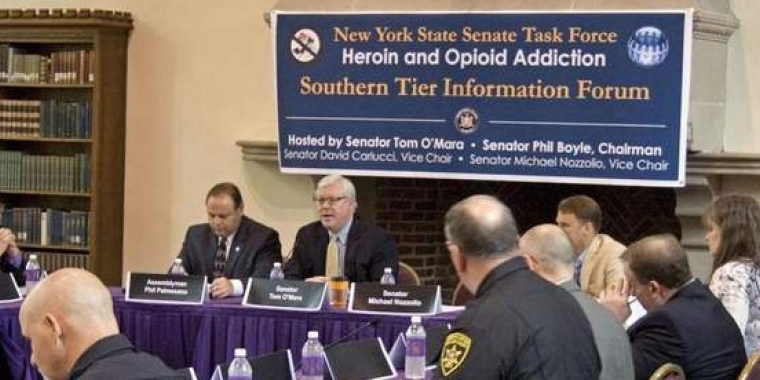
O’Mara bringing Joint Senate Task Force on Heroin to Yates County on Feb. 23 to examine growing heroin epidemic regionally ~ Read and listen to more

Penn Yan, N.Y., February 4—State Senator Tom O’Mara (R,C,I-Big Flats) will bring the Joint Senate Task Force on Heroin and Opioid Addiction to Penn Yan on Tuesday, February 23, 2016 for a legislative forum on the heroin epidemic regionally.
The forum, which will be open to the public, will be held in the Penn Yan Middle School Auditorium at 515 Liberty Street, beginning at 6:30 p.m.
The bipartisan Senate task force, on which O’Mara serves as a member, was created in 2014 at a time when local police departments and addiction centers, including many across the Southern Tier and Finger Lakes regions, were pointing to the alarming rise in the availability and use of heroin. O’Mara sponsored a task force hearing at Elmira College in early 2014.
O’Mara said that since that time, while the work of the Senate task force has helped to enact important new state-level laws and other responses, the heroin crisis has grown increasingly urgent and continues to spread across the Southern Tier and Finger Lakes regions, as well as throughout New York State and the nation.
“We need to keep working, at every level of government, to try to keep our laws, programs and services ahead of this public health crisis. We can’t let up for one second on the alarming threat of heroin, meth, synthetic substances, bath salts and other illegal drugs spreading throughout our communities. In particular, the growing heroin crisis is far too great a risk to spiral out of control and overwhelm individual lives along with local systems of health care, law enforcement, criminal justice and social services,” said O’Mara. “I look forward to bringing the members of the task force to Yates County to hear directly from those on the front lines locally who can help us target the necessary responses. This community has been particularly and admirably active in the fight against heroin. Yates County Sheriff Ronald Spike and so many community leaders, families and other concerned citizens have been vocal and active. I look forward to offering them this opportunity to provide their input directly to our Senate task force so that we can work together to keep trying to target the most up to date and effective combination of law enforcement, awareness and education, and treatment and prevention that will better protect our communities and save lives, especially young lives.”
[Read and listen to more on Finger Lakes Radio News, "NYS Senate Task Force To Hold Heroin Forum In Penn Yan"
O’Mara and his colleagues are seeking testimony from regional law enforcement officers, drug addiction counselors, treatment providers, recovering addicts and family members, social services and mental health professionals, and other experts about the range of complex challenges posed by heroin including addiction prevention and treatment options, drug-related crimes, and other community and public safety impacts.
According to figures from Cayuga Addiction Recovery Services, the numbers of 19-to-25 year olds in the Southern Tier and Finger Lakes treated for drug abuse increased more than 35 percent from 2007 to 2012. The National Institutes of Health (NIH) has estimated that approximately 23 percent of those who use heroin become dependent on the highly addictive drug.
In addition to the Penn Yan forum, the Senate task force has also scheduled additional hearings throughout the state. The panel is co-chaired by Senators George Amedore (R,C,I-Rotterdam), Terrence Murphy (R,C,I-Yorktown) and Robert Ortt (R-North Tonowanda).
O’Mara, who has been highlighting the proliferation of heroin, meth, bath salts and other illegal drugs across the Southern Tier and Finger Lakes over the past few years, said that the Senate task force is targeting the alarming rise in heroin use and addiction across New York and will continue to develop legislative recommendations for combating, preventing and treating the drug’s spread.
Over the past two years, the work of the Senate panel has led to the enactment of numerous new laws which O’Mara has co-sponsored, including new laws to:
> require the state Office of Alcoholism and Substance Abuse Services (OASAS) and the state DOH to establish the “Combat Heroin” awareness and education program. The program utilizes social and mass media to reduce the stigma associated with drug addiction, while increasing public knowledge about the dangers of opioid and heroin abuse, the signs of addiction, and relevant programs and resources (combatheroin.ny.gov);
> establish school-based drug prevention programs to add age-appropriate information about the dangers of illegal drug use to junior high and high school health class curriculums;
> establish the Opioid Treatment and Hospital Diversion Demonstration Program, requiring the development of a new model of detoxification and transitional services for individuals seeking to recover from opioid addiction that reduces reliance on emergency room services;
> enable parents with a child suffering from substance use disorder to receive an assessment for the disorder through the Person in Need of Supervision (PINS) diversion process and thereby access a variety of counseling and treatment services;
> create a “Relapse Prevention Demonstration Program” to allow OASAS to provide referral services for individuals while they’re participating in a substance abuse treatment program, and for nine months afterwards. The community support referrals, aimed at preventing relapses, include educational resources, peer-to-peer support groups, social services and family services and counseling, employment support, transportation assistance, legal services, and child care services;
> promote the affordability of substance abuse services by requiring insurers to comply with federal substance abuse parity laws, strengthening and standardizing the utilization review process for determining insurance coverage for substance abuse treatment disorders, and requiring insurers to continue to provide and reimburse for treatment throughout the appeals process;
> authorize DOH Bureau of Narcotic Enforcement (BNE) investigators to directly access the criminal histories of individuals suspected of criminally diverting prescription medications;
> penalize obtaining a controlled substance by fraud or deceit; and
> make the sale of a controlled substance by a physician or pharmacist a Class C felony.



